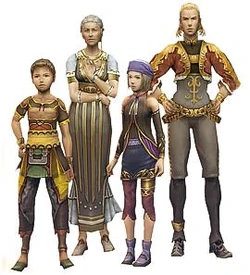| Human | |||
|---|---|---|---|
| General information | |||
| Universe | Real Life | ||
| Aliases | Earthling Terran Human Mortal Muggle Midgardian Meat bag (derogatory term coined by robots) Man (Male Or interchangeably) Woman (Female) Common Human Earthican Hume Sim | ||
| Classification | Homo sapiens | ||
| Species type | Human | ||
| Homeworld | Earth | ||
| Environment | Urban Suburban Rural Etc. | ||
| Intelligence | Sapient | ||
| Biochemistry | Carbon-based | ||
| Biological information | |||
| Lifespan | 80 years (average) 122 years (longest lived) Immortal | ||
| Reproduction | Sexual; giving live birth | ||
| Locomotion | Bipedal | ||
| Feeding behavior | Omnivorous | ||
| Distinctive features | bipedal stance, small nose, hair on only certain regions, soft skin, round ears | ||
| Eye color | Varies | ||
| Skin color | Varies | ||
| Lineage information | |||
| Ancestor(s) | Homo habilis Homo erectus Neanderthal | ||
| Subspecies | Homo sapiens idaltu (extinct) Homo sapiens sapiens (extant) Cro-magnon (extinct) New Donker Mutant | ||
| Descendant(s) | Suitor Superhuman | ||
| Related species | Homo hylia (Hylian) Teletubby Homo nintendonus Villager | ||
| Cultural information | |||
| Alignment | Varies | ||
| Sociocultral characteristics | |||
| Scientific taxonomy | |||
| Planet | Earth | ||
| Domain | Eukaryota | ||
| Kingdom | Animalia | ||
| Phylum | Chordata | ||
| Subphylum | Vertebrata | ||
| Superclass | Tetrapoda | ||
| Class | Mammalia | ||
| Order | Primates | ||
| Family | Hominidae | ||
| Genus | Homo | ||
| Species | H. sapiens | ||
| Other information | |||
| Status | Least Concern Extinct | ||
| Creator | God (debated) | ||
| First sighting | Unknown | ||
| Last sighting | Current | ||
| Possible population | 7.9 Billion | ||
The modern human (Homo sapiens) is said to be the only extant member of the "Homo" genus.
Biology
Humans can be best identified by their bipedal stance, only having hair on their heads, chest, underarms, and sometimes on their faces. They are omnivorous, yet a few chose to be vegetarian, if not vegan (meaning one who does not eat any animal products).
Abilities
Humans may or may not have the ability to sense danger with Spiderman-style “spider-senses,” or sprout adamantium claws like Wolverine, but there are humans walking among us that have their own superpowers. These superhumans have powers the typical person would think impossible, and they are the result of genetic mutations

